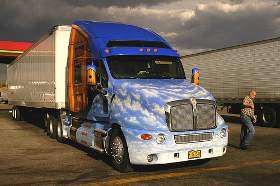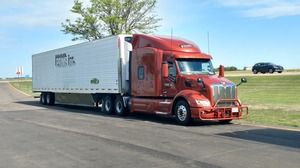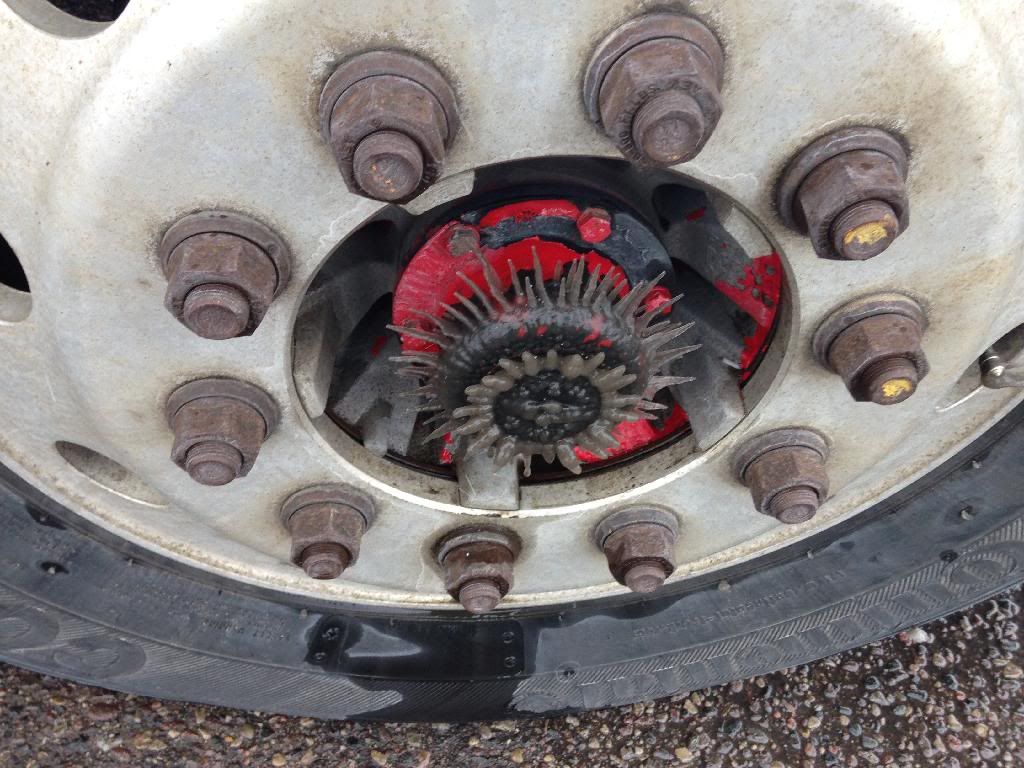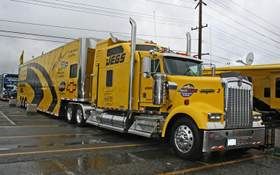Worth The Extra Penny?
Topic 2992 | Page 1

Let me follow up with my end goal - to be at home w/ my family as much as possible. I've already thought that perhaps I'd keep w/ my first company for a year, and then apply for a local job to be at home more. NEMF has a terminal about 5 minutes away. I thought about applying for a line haul job after my first year w/ Crete/Shaffer. Line haul seems to be night shift, but I'll be home every day. Schneider's tanker division has a 6 day "pick as you choose" hometime available. Plus they have some local jobs near me, and intermodal. Not sure what would be the best way to approach.
Terminal:
A facility where trucking companies operate out of, or their "home base" if you will. A lot of major companies have multiple terminals around the country which usually consist of the main office building, a drop lot for trailers, and sometimes a repair shop and wash facilities.
Line Haul:
Linehaul drivers will normally run loads from terminal to terminal for LTL (Less than Truckload) companies.
LTL (Less Than Truckload) carriers will have Linehaul drivers and P&D drivers. The P&D drivers will deliver loads locally from the terminal and pick up loads returning them to the terminal. Linehaul drivers will then run truckloads from terminal to terminal.Intermodal:
Transporting freight using two or more transportation modes. An example would be freight that is moved by truck from the shipper's dock to the rail yard, then placed on a train to the next rail yard, and finally returned to a truck for delivery to the receiving customer.
In trucking when you hear someone refer to an intermodal job they're normally talking about hauling shipping containers to and from the shipyards and railyards.
OOS:
When a violation by either a driver or company is confirmed, an out-of-service order removes either the driver or the vehicle from the roadway until the violation is corrected.
Well my 2 cents is this: It doesn't matter where you start as a rookie its all about personal preference. In reefer you do alot of live loading and unloading. This takes awhile. Trust me. Big outfits like Walmart, McClane, Sams Club, Walgreens ect are anywhere between 3 to 5 hrs unloading/loading. You have the extra hassel of fueling the reefer so if you also have a truck that requires DEF thats 3 things to fuel. Now from my experience reefer hardly ever slows down. Reason being everyone eats everyday so the demand for food never stops. We can also haul dry freight so more options. Our appointments though are typically late night early morning. Dry box typically has alot more drop and hook. Not always but more than reefer. Cant tell ya too much else since I dont haul dry box but my friends who do have alot of open appointments and they typically are at reasonable hours. Now Thinks too much can tell ya all about tanker but I want you to consider this. PA has ALOT of tanker jobs. Especially water tanker. All local positions. They might meet better with your end result? Most require 1 yr OTR. Just a thought.
OTR:
Over The Road
OTR driving normally means you'll be hauling freight to various customers throughout your company's hauling region. It often entails being gone from home for two to three weeks at a time.
Reefer:
A refrigerated trailer.
Drop And Hook:
Drop and hook means the driver will drop one trailer and hook to another one.
In order to speed up the pickup and delivery process a driver may be instructed to drop their empty trailer and hook to one that is already loaded, or drop their loaded trailer and hook to one that is already empty. That way the driver will not have to wait for a trailer to be loaded or unloaded.

THanks RedGator, I"ve seen your posts before on this forum and I much appreciate a fellow PA dweller commenting on my post. I've heard before that reefers can also haul dry freight. Just not sure about all the extras that come w/ hauling reefer. I also sent Thinkstoomuch a private email, but figured I'd post this in the public forum first so that others might learn from it.
Same as my concerns being a rookie and hauling reefer , but perhaps even more so, I'm wondering if starting out as a rookie hauling tanker is a good decision. I know others have done so. I'm intriguied about REdGator's comment on the abundance of tanker jobs in PA. I've looked into dry bulk like Bulkmatic, and also Venezia - both of which are close to my home. Tanker attracts me for the higher wages. But ultimately it comes down to hometime for me and my family.
Reefer:
A refrigerated trailer.

I'll be starting out in reefer division as a rookie. I do have a little bit of experience with a reefer unit in a local delivery company. The main thing is to keep an eye on your display on the reefer, make sure it stays within the acceptable temp range for what you are hauling. The sooner you see an issue the sooner you can hopefully correct it so not to damage the load. On the trucks I drove, the reefer ran off the fuel tanks the truck itself used (small box truck), so I didn't have the hassle of an extra fuel tank, nor did I have to mess with the DEF tank then. They got newer trucks with DEF after I stopped driving for them. Having the experience of hauling reefer, after your year you could possibly get on with your local grocery chain delivering to the stores in your area. Where I live I see the local stores trucks around with day cabs, so I would assume they are home nightly.
Day Cab:
A tractor which does not have a sleeper berth attached to it. Normally used for local routes where drivers go home every night.
Reefer:
A refrigerated trailer.

DEF? What is DEF? Is that like DEF CON 1 where they are about to unload on us with nukes? Just curious (or is in DEF CON 4?)

DEF? What is DEF? Is that like DEF CON 1 where they are about to unload on us with nukes? Just curious (or is in DEF CON 4?)
DEF as in Diesel Exhaust Fluid.
Ernie

DEF is a separate tank that is required by law on newer diesel engines. Somehow it helps reduce carbon emissions from the engines. You have to fill your DEF tank each time you fuel. If your DEF tank get too low, the engine will govern down to a crawl until you can get more DEF. It is mandated by law on all diesel engines made after a certain year. You will start to see it more and more as older trucks get retired.

I think I mentioned this before somewhere but it does not matter if you live 10 feet from the terminal or 500 miles. You home time is determined by your companies home time policy. 3 to 4 weeks out is still 3 to 4 weeks out even if you lived in the same building as the dm. And I have seen this happen time and time again....wWhen I was with another company I knew this guy that had a dedicated account and his route took him right by the house....I mean he drove past his own driveway but he could not stop due to time limitations on his loads.
Oh you might as well know this now....Companies for whatever reason like to run you just about anywhere that you house is not and they worry about getting you home when it's time for hometime.
Terminal:
A facility where trucking companies operate out of, or their "home base" if you will. A lot of major companies have multiple terminals around the country which usually consist of the main office building, a drop lot for trailers, and sometimes a repair shop and wash facilities.
Dm:
Dispatcher, Fleet Manager, Driver Manager
The primary person a driver communicates with at his/her company. A dispatcher can play many roles, depending on the company's structure. Dispatchers may assign freight, file requests for home time, relay messages between the driver and management, inform customer service of any delays, change appointment times, and report information to the load planners.
Companies for whatever reason like to run you just about anywhere that you house is not and they worry about getting you home when it's time for hometime.
True statement!
New Reply:
New! Check out our help videos for a better understanding of our forum features

















Preview:
This topic has the following tags:
Choosing A Trucking Company







 TT On Facebook
TT On Facebook
I'm pretty much settled on Crete Carrier or Shaffer Trucking for my first company, if they'll take me. Schneider National is runner up - especially their tanker division. My question, is it worth the extra penny per mile to run reefer vs dry van? I believe that where I live, which is about 15 minutes from the New Kingstown terminal (Shaffer's 'home' terminal), that I'd get more opportunity for hometime w/ Shaffer, although they've recently changed their website and I dont' see .47 per mile for HBG, PA runs anymore. I'm leaning towards not having to deal w/ a reefer for a rookie, but I don't want to limit my options. I've already read Brett's articles on different freight jobs. Doing the math, it seems that it isn't that much of a difference to run dry van as opposed to reefer. Is it best for a rookie to not have to concentrate as much on a reefer trailer as opposed to a dry van? Let alone trying to start as a tanker driver w/ Schneider?
Terminal:
A facility where trucking companies operate out of, or their "home base" if you will. A lot of major companies have multiple terminals around the country which usually consist of the main office building, a drop lot for trailers, and sometimes a repair shop and wash facilities.
Dry Van:
A trailer or truck that that requires no special attention, such as refrigeration, that hauls regular palletted, boxed, or floor-loaded freight. The most common type of trailer in trucking.Reefer:
A refrigerated trailer.